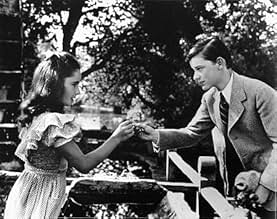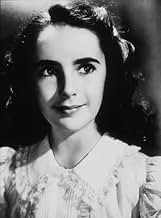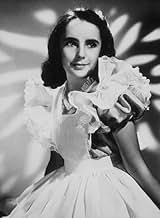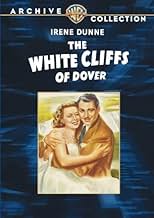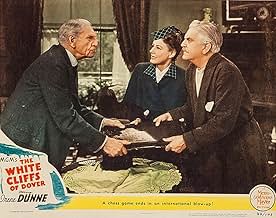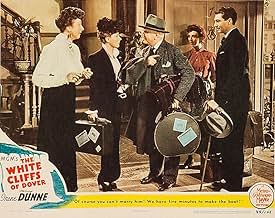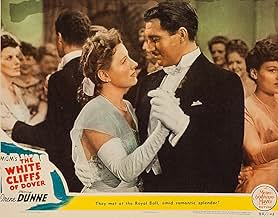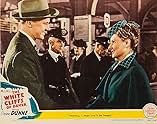Susan travels with her father to England for a vacation. Invited to a ball, Susan meets Sir John Ashwood and marries him after a whirlwind romance. However, American Susan never quite adjust... Read allSusan travels with her father to England for a vacation. Invited to a ball, Susan meets Sir John Ashwood and marries him after a whirlwind romance. However, American Susan never quite adjusts to life as a new member of the British gentry.Susan travels with her father to England for a vacation. Invited to a ball, Susan meets Sir John Ashwood and marries him after a whirlwind romance. However, American Susan never quite adjusts to life as a new member of the British gentry.
- Nominated for 1 Oscar
- 3 wins & 1 nomination total
- Nanny
- (as Dame May Whitty)
- English Cabbie
- (uncredited)
- Chauffeur
- (uncredited)
- Immigration Officer
- (uncredited)
- Major Rupert Bancroft
- (uncredited)
- Indian Major in Boardinghouse
- (uncredited)
Featured reviews
Alas, when they arrive, they are treated to the typical rainy weather, that puts a damp, no pun intended, in her enjoyment of a city and all things English she has always admired. Instead of finding a place that meets all her expectations, Susan has to endure the weather and the prospect of going back without seeing the sights and places she really wanted to see.
Enter the kind Colonel, the man living in the modest hotel where the Dunns are staying. He invites Susan to a society ball where she meets Sir John Ashwood, the man who will become her husband. John is instrumental in her staying in England. Susan never expected to be married into the rich gentry that John belongs to. In fact, the beginning of her life in the family country estate convinces her she doesn't belong.
It's 1915 and WWI arrives without warning. Susan sees in horror how John goes to his regiment and to the front. He eventually dies, but the son that arrives for her is, in a way, a painful reminder of the great loss she suffered. Like his father, the boy grows up and has to go to war, as it's expected of his kind.
"The White Cliffs of Dover" was directed by Clarence Brown, who gave it a great look. Irene Dunne makes a good impression as Susan, the courageous woman who stays in a strange country and has to make a new life for herself and her new family. Alan Marshal is perfect as the dashing John Ashwood.
In minor roles we see Roddy McDowall, who plays the young John Ashwood. Harry Morgan is Susan's father. Gladys Cooper, May Witty, Peter Lawford, Van Johnson, C. Aubrey Smith, and the rest of the cast do good work. The young Elizabeth Taylor is seen as the young Betsy and June Lockhart appears as the grown up girl in uncredited roles.
"The White Cliffs of Dover" is about loyalty for one's country and how tradition plays a role in the lives of all the people one meets in the story, even during the difficult times these characters had to live.
I heard it said that the main fact about the 20th Century that one should realize in studying it is that the United States and Great Britain both spoke a common language. That fact made us overcome a few cultural differences and was the reason America entered two World Wars to save a Great Britain from invasion.
Thus it was for Irene Dunne who came over with her father Frank Morgan on holiday in 1914 and met and married a minor titled fellow played by Alan Marshal. Marshal is killed and she spends a long widowhood raising their son and heir to his title. She lives with her mother-in-law, Gladys Cooper and raises her son who at various times is played by Roddy McDowall and Peter Lawford. The son rather fancies the daughter of one of their tenants played at various times by Elizabeth Taylor and June Lockhart.
Of course this interoceanic love feast has a rather rocky beginning, especially when Frank Morgan while arguing chess with C. Aubrey Smith gets confronted with the fact that the chess board and pieces were the property of the looted White House from the War of 1812. It's my favorite scene in the film.
Dunne who ages gracefully and magnificently gives a stirring performance as a woman who lost what she loved in one war and is ready to sacrifice again for her adopted country. I've a feeling that the folks at MGM might have had her character as an answer to that real female American expatriate, Lady Nancy Astor and that we were all not members in good standing of the Nazi appeasing Cliveden set.
There's also a scene similar to the one in Mrs. Miniver where Greer Garson has to entertain a wounded German flier, Helmut Dantine where he's made a symbol of what they're at war against. Dunne, Morgan, and McDowall entertain a pair of German boys on holiday and when the discussion turns to politics it gets pretty heated. These two are thinking nothing more than winning what they should have won back in 1918.
The White Cliffs Of Dover is a nice film, typical of the era it came out of. You do wonder though if Irene Dunne had met a nice German guy from the Weimar Republic days how that might have been dealt with.
Along the way there are some great scenes and clever dialogue, especially when you consider that the entire movie was based on the titular poem-and that the poem really has nothing to do with the plot. Irene gets invited to a ball during her vacation by C. Aubrey Smith, who quickly guesses she'll be a great match for Alan Marshall. He sets them up, and they fall in love. Irene never returns from her vacation, but at least Frank visits often. He and C. Aubrey have some very funny scenes together.
As WWI starts, Alan joins the army. When he's killed, Irene performs a touching, tragic scene as she holds her newborn son and defies the war. She vows no war will ever take her son away and kill him, as her mother-in-law Gladys Cooper and the baby's nurse Dame May Whitty tearfully look on. In another wonderful scene, the Americans march the streets of London, and Irene holds her son up to see the troops. She weeps tears of joy knowing the war will soon be over; for the Americans in the audience, it's very moving and patriotic.
There's a lot more to this movie, and if you're brave enough to sit through it with a box of Kleenex, you'll get to see Roddy McDowall and Elizabeth Taylor, as well as Peter Lawford, June Lockhart, Miles Mander, and Van Johnson. You'll also get to hear beautiful music by Herbert Stothart. If you're an Irene Dunne fan, you're probably used to seeing her in very sad movies; you've got to watch one of her greatest performances in The White Cliffs of Dover.
Did you know
- TriviaIrene Dunne reads a telegram from her Anglophobe father to a group of English people. Her father begs her not to marry an Englishman she is in love with and tells her "You're a Yankee through and through! Think of Paul Revere! Think of the Old North steeple! Remember the Alabama!" The viewer may become confused at this point. "Remember the Alabama"? Shouldn't it be "Remember the Alamo"? However, since the context of the telegram is anti-British any mention of the Alamo would be irrelevant. What Irene Dunne's father is apparently taking about is the C.S.S. Alabama, one of several Confederate warships that were built in British shipyards over United States protest during the Civil War. These ships attacked U.S. shipping in the Atlantic Ocean. Since Irene Dunne arrives in England in April of 1914 and married just before August 4, 1914 when Great Britain declared war on Germany, the telegram was probably sent close to the 50th anniversary of the sinking of the Alabama by the U.S.S. Kearsarge on June 19, 1864 in the English Channel. The United States sued Great Britain in 1869 over the building of the Confederate warships and was awarded $15.5 million.
- GoofsA gift with a plaque dedicated to First Lady, Dolley Madison, misspells her name "Dolly Madison."
- Quotes
Susan Dunn's landlady: [Of Susan]
Susan Dunn's landlady: Such a nice young thing! Not a bit like an American.
- Alternate versionsElizabeth Taylor's scenes are often deleted in older TV prints.
- ConnectionsFeatured in Twenty Years After (1944)
- SoundtracksAuld Lang Syne
(1788) (uncredited)
Traditional Scottish 17th century music
Lyrics by Robert Burns
Played during the opening credits and often in the score
Details
- Runtime
- 2h 6m(126 min)
- Color
- Aspect ratio
- 1.37 : 1


